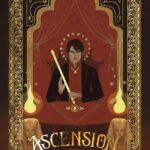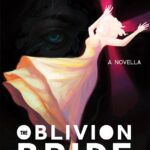
Genres: Adult, Fantasy, Secondary World Fantasy
Representation: ugly MC
PoV: 1st-person, past-tense
Published on: 4th March 2025
ISBN: 164566192X
Goodreads

In the beloved tradition of Howl’s Moving Castle, a whimsical and unforgettable story of fantastic adventure, common sense, and the power of love to overcome the greatest of obstacles . . .
Before Foss Butcher was Snagged, she thought no more of the magic-users than did anyone else in her tiny village. Sometimes gorgeous women in impossible carriages rolled into town and took bits of people’s hearts. Everyone knew hearts fueled their magic. But Foss, plain, clumsy, and practical as a boot, never expected anyone would want hers.
True enough, when the only sorcerer in the kingdom stepped from his glossy carriage, he didn’t intend to hook Foss. Sylvester’s riot of black curls and perfectly etched cheekbones caught her eye a moment too long, that was all. Suddenly, Foss is cursed and finds herself stomping toward the grand City to keep his enchanted House, where her only friend is a talking cat and the walls themselves have moods.
But as Foss learns the ways of magic, she realizes she’s far from its only unwilling captive. Even Sylvester is hemmed in by spells and threats. It’s said this sorcery protects king, country, and order for thousands. If Foss wants to free herself—and, perhaps, Sylvester—she’ll have to confront it all . . . and uncover the blight nestled in the heart of the kingdom itself.
I received this book for free from the publisher via NetGalley in exchange for an honest review. This does not affect my opinion of the book or the content of my review.
Highlights
~a heroine who’s actually ugly!
~the kingdom’s downfall…is mould
~one very excellent talking cat
~sentient houses ftw
~put that heart back where it came from, or so help me!
I probably wouldn’t have picked up Harvest of Hearts if it wasn’t being published by Erewhon Press, aka my favourite indie – and that would have been a shame, because it’s a marvellous little book!
The blurb is not wrong: Harvest does bear a tiny, superficial resemblance to Howl’s Moving Castle – they both feature brilliant, no-nonsense girls ending up as housekeepers to ridiculous wizards under false pretences. They both have wonderful not-human companion characters – Calcifer in Howl’s Moving Castle, and Cornelius the cat in Harvest.
But that’s it! They are not the same story, and Harvest never struck me as derivative. The similarities are only set-dressing. So please adjust your expectations accordingly – if you’re looking for another Howl’s Moving Castle, this is not it.
Now that that’s out of the way, let’s talk about what Harvest is!
the city’s blooming flowers that clambered over every wall, great fat things with too many petals, like women wearing all their best clothes at once.
Harvest is defined by Foss, the main character who is also our narrator. Foss is a delightfully no-nonsense, practical young woman, very direct and blunt and – not crude, exactly, but – earthy? Frank. She calls it like she sees it, and a lot of what she says are things plenty of us have to be thinking, but that almost no one mentions;
he stepped a few feet ahead and led me forwards, tail up and twitching, his little cat arsehole winking at me with each step.
If you have ever walked behind a cat, you have absolutely had this moment too!
I really, really loved this about Foss. I loved that she could talk about the practicalities of being a butcher without flinching or prettifying the work; I loved that she masturbates and doesn’t couch that in euphemisms either (take a second and think about how rarely you see any mention of women masturbating in fiction); I loved her phrasing, the imagery and word choices that make her sound like exactly what she is, a young woman who’s grown up in a rural village, doing manual, blue-collar work, deeply sceptical of Fancy Stuff. A neat example is the repeated use of the word ‘sparklies’ to refer to the Extremely Expensive jewel-work all over rich people’s clothes and carriages and whatnot – instead of being awed, instead of waxing poetic about jewels and gems, we get the dismissive, kind of patronising term ‘sparklies’, as if she’s talking about kids playing dress-up or birds collecting bottle-caps. This kind of attention to detail is everywhere present in Foss’ narration, and helps make the sense of her personality so clear and strong.
I can’t remember the last time I saw an author craft first-person narration with so much care, paying so much attention to word choice and imagery, making sure every word reinforces the character. It’s just – *chef’s kiss*
a long black leather boot with a shine on it like the wet on a dog’s nose
I also really, REALLY love that FOSS ISN’T PRETTY. She’s not even ‘plain’; she’s outright unattractive, physically, and is well aware of it. It’s so freaking rare for us to get a fantasy heroine (especially one in a story that has such a strong romantic element) who isn’t beautiful that Foss’ looks are almost a novelty, but they’re also plot-relevant. Being Snagged means Foss is magically compelled to love the sorcerer who Snagged her – and one of the many torturous aspects of this is her belief that someone ugly crushing on someone who is magically beautiful (as the sorcerer is) is extra shameful; she’s humiliated by it, by this aspect of it specifically. That her free will has been taken away is already awful, but she’s aware of how ridiculous most people would think her for swooning after someone so pretty when she isn’t, and that burns badly. Honestly, anyone who’s ever had doubts about their looks (and who hasn’t?) is going to identify with Foss a lot; it’s not that she goes on and on about not being pretty, because she doesn’t – but her moments of shame, shyness, unhappiness about it cut to the core.
And – minor spoiler, I guess? – no one magics her pretty at any point. I was so relieved that she got to stay unpretty!
There was nary a beggar to be seen. They probably gave them a kick and sent them rolling downhill if they dared to venture up this far.
That the sorcerers are all exquisitely, inhumanly beautiful is a powerful contrast to Foss’ looks and status, and I really appreciated that. Although the fact that the king, who is the ultimate villain, is fat and ugly, undermined it in a way that surprised me. That was jarring.
(Also don’t really love that the sorcerers are actually sorceresses – they’re all women, except for the one man who Snagged Foss, who is the love interest and thus Not Evil like the rest.)
I disagree with all the PR calling this a cosy fantasy, by the way. It’s…really not? Foss is in physical and psychological anguish for most of the book, and the big plot is the discovery that the sorcerers the kingdom depends on are routinely killing people – slowly and awfully – to power their magic. She’s almost killed multiple times. The sorcerers are genuinely monstrous (wait until you discover how they become sorcerers) and their magic runs on literal human hearts, which we see a lot of. The only way to save the day is to sacrifice – quite a lot!!! A very big, important thing!!! We even have magical biological warfare, and repeated insistence that there is no other way to save the day. It’s really not sweet and nice.
This is where I think Harvest fell down: although the first two thirds of the book are great, towards the end the story was trying to hold on to the…not-quite-cosy…vibe, while raising the stakes to the stratosphere. And you just can’t have both. The result was kind of messy and felt very rushed, and I wish the stakes had been kept much lower – say, to what they originally are, before the Le Gasp!reveal about what’s going on outside the kingdom. And I was really pissed off by the final pages, which pulls the teeth of the climax in a way that I think is just cowardly. If you go ahead and actually {MASSIVE SPOILER}, one of the biggest, scariest things you can DO as a storyteller…COMMIT, don’t magic-wand fix it seconds later! That just. Retroactively ruins it, makes it all meaningless.
However, I think readers more invested in happy endings than I am won’t hate the ending like I did. So there’s that?
The older lady with the fancy clothing cupped her face in her hands and started to weep. And I do mean weep, not cry. Crying was a low-bred thing to do, but weeping was higher-pitched, and involved a lace handkerchief and small, ladylike sniffs.
Despite this being a story about magic and sorcerers and talking cats, there’s a streak of – realism? Kinda? – running through it that, like Foss’ narration, does elevate Harvest into something noteworthy, whatever I think of the last chunk of the book. Foss has to look for toilets, which most stories just ignore; there are moments when her body gives out on her in ways that fiction, especially fantasy, doesn’t like to talk about. At one point, after being kept captive, she says she can’t run any more; she’s told she has to…and instead of conveniently finding new strength, she snaps back that she CAN’T. And she can’t because, bluntly, nobody could, after what she’s just gone through. Maybe the best thing about this book is that Foss is human, with all that that means, and Eames never forgets it, refusing to gloss over the reality of that, even in a genre where doing so is the default. I really want to highlight and applaud that!
And it’s a big part of why I don’t regret reading Harvest, why I think it is a good book, even if the last act is noticeably weaker. It’s not the best thing I’ve ever read, but it was still a really good time, and Foss is worth reading for all by herself.
(I genuinely cannot overstate how much I love Foss. FOSS IS THE BEST!)
Check out some other reviews – I know my message is a bit mixed, here. But I’m glad I read it. And I will happily keep an eye out for more books from Eames in the future!






Leave a Reply